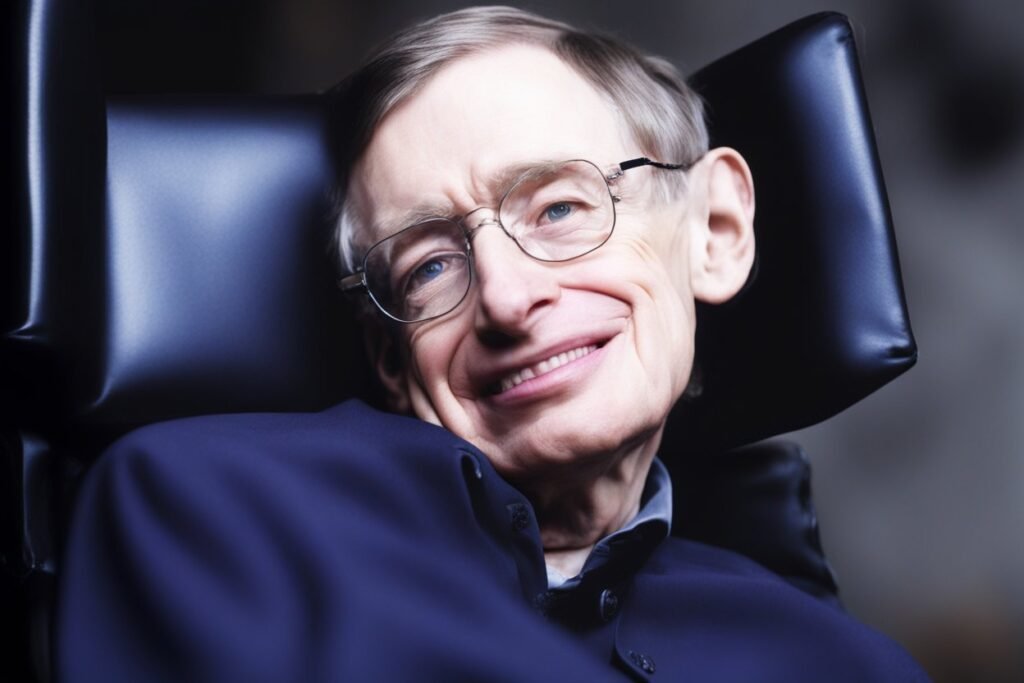
Nicknames for Stephen Hawking

Stephen Hawking, one of the most brilliant minds in the field of theoretical physics, was known not only for his groundbreaking contributions to science but also for his resilience and sense of humor. Despite being diagnosed with ALS (Amyotrophic Lateral Sclerosis) at a young age, which gradually paralyzed him, Hawking's intellectual brilliance and unique perspective on the universe made him a beloved figure worldwide.
Over his life and career, many nicknames and titles have been used to refer to him, often highlighting his extraordinary abilities, his iconic status, and his contributions to science.
- Stephen Hawking's best nicknames
-
Frequently Asked Questions (FAQ) about Stephen Hawking's Nicknames
- 1. Why was Stephen Hawking called "The Einstein of Our Time"?
- 2. What is the meaning of the nickname "The Cosmic Guru"?
- 3. Why is Stephen Hawking called "The Black Hole King"?
- 4. What does the nickname "The Theoretical Giant" mean?
- 5. Why was Stephen Hawking referred to as "The Hawk"?
- 6. What does the nickname "The Voice of the Universe" refer to?
- 7. Why did people call Stephen Hawking "The Master of the Universe"?
Stephen Hawking's best nicknames
Here are some of the most famous and endearing nicknames and titles associated with Stephen Hawking:
1. The Master of the Universe
Stephen Hawking earned the title "Master of the Universe" because of his profound work on black holes, cosmology, and the origins of the universe. His theoretical predictions about the nature of space-time, black holes, and the Big Bang earned him global recognition as one of the greatest scientists of all time.
2. The Brilliant Mind
Hawking was often referred to as "The Brilliant Mind" due to his exceptional intellectual prowess. His ability to make complex ideas about the universe understandable to the public, despite his physical limitations, further cemented his place as one of the most remarkable minds in modern science.
3. The Einstein of Our Time
Often compared to Albert Einstein, who is widely regarded as one of the most influential scientists in history, Stephen Hawking was sometimes called "The Einstein of Our Time." This nickname reflected his contributions to our understanding of space, time, and the nature of the universe, which have had a similar lasting impact on science.
4. The Cosmic Guru
This nickname reflects Stephen Hawking's ability to explain the mysteries of the cosmos to people from all walks of life. Whether in his books or public lectures, Hawking's explanations of complex scientific theories made him a "guru" for understanding the universe, earning him the admiration of both academics and the general public.
5. The Hawk
A simple, yet affectionate nickname, "The Hawk" is a play on Stephen Hawking’s last name. This shortened version is often used by fans and colleagues to refer to him with affection, reflecting his sharp intellect and commanding presence in the scientific community.
6. The Theoretical Giant
Stephen Hawking was known for his groundbreaking work in theoretical physics, particularly his contributions to our understanding of black holes and the theory of relativity. The nickname "The Theoretical Giant" highlights his immense contributions to this field and his larger-than-life influence on the scientific world.
7. The Black Hole King
Hawking's work on black holes revolutionized our understanding of these mysterious objects in space. His theories, including the discovery that black holes emit radiation (now known as Hawking radiation), earned him the title "The Black Hole King." This nickname acknowledges his expertise and groundbreaking discoveries related to black holes.
8. The Physicist with the Greatest Mind
This nickname captures the deep respect and admiration that people had for Stephen Hawking’s intellectual abilities. As a physicist, his work spanned areas such as cosmology, quantum mechanics, and general relativity, and his ability to tackle the most difficult scientific questions earned him this title.
9. The Cosmic Explorer
Stephen Hawking’s work often dealt with questions about the nature of the universe, the origins of the cosmos, and the possibility of life beyond Earth. As a "Cosmic Explorer," he ventured into uncharted territories of scientific thought, exploring ideas about time travel, black holes, and the ultimate fate of the universe.
10. The Voice of the Universe
Stephen Hawking, despite his illness, was known for his ability to communicate complex scientific ideas with clarity and precision. His voice, often aided by a computer synthesizer, became iconic. "The Voice of the Universe" is a fitting nickname that highlights both his ability to speak on behalf of the scientific community and his role in explaining the universe to the public.
Frequently Asked Questions (FAQ) about Stephen Hawking's Nicknames
1. Why was Stephen Hawking called "The Einstein of Our Time"?
Stephen Hawking was often referred to as "The Einstein of Our Time" because, like Albert Einstein, he made groundbreaking contributions to the field of theoretical physics. His work on black holes, the Big Bang, and the nature of the universe earned him a place among the most influential scientists in history, akin to Einstein’s status in the previous century.
2. What is the meaning of the nickname "The Cosmic Guru"?
"The Cosmic Guru" refers to Stephen Hawking’s ability to explain the mysteries of the universe in an accessible and engaging way. He was admired for his capacity to make complex concepts understandable to the general public, and his expertise in cosmology made him a trusted figure for those seeking to understand the cosmos.
3. Why is Stephen Hawking called "The Black Hole King"?
Hawking earned the title "The Black Hole King" due to his groundbreaking work on black holes. He proposed that black holes could emit radiation (known as Hawking radiation), which changed how scientists understood these objects. This nickname acknowledges his pioneering research and discoveries in the field of black hole physics.
4. What does the nickname "The Theoretical Giant" mean?
"The Theoretical Giant" reflects Stephen Hawking’s immense contributions to the field of theoretical physics. He developed revolutionary ideas about black holes, cosmology, and the nature of the universe, and his work continues to influence the field today. This nickname emphasizes his towering influence in the world of theoretical science.
5. Why was Stephen Hawking referred to as "The Hawk"?
"The Hawk" is a simple and affectionate nickname derived from his last name. It reflects both his sharp intellect and his commanding presence in the scientific community. This nickname was often used by fans and colleagues who admired his work.
6. What does the nickname "The Voice of the Universe" refer to?
"The Voice of the Universe" refers to Stephen Hawking's role in communicating complex scientific ideas to the world. Despite his physical limitations, he became an iconic figure whose voice, synthesized by a computer, was used to share his groundbreaking work and explain the mysteries of the universe to people everywhere.
7. Why did people call Stephen Hawking "The Master of the Universe"?
Stephen Hawking was known for his revolutionary contributions to understanding the nature of the universe, particularly through his work on the Big Bang theory and black holes. "The Master of the Universe" reflects his central role in advancing our understanding of the cosmos, earning him recognition as one of the most influential scientists of all time.






You may be interested in: